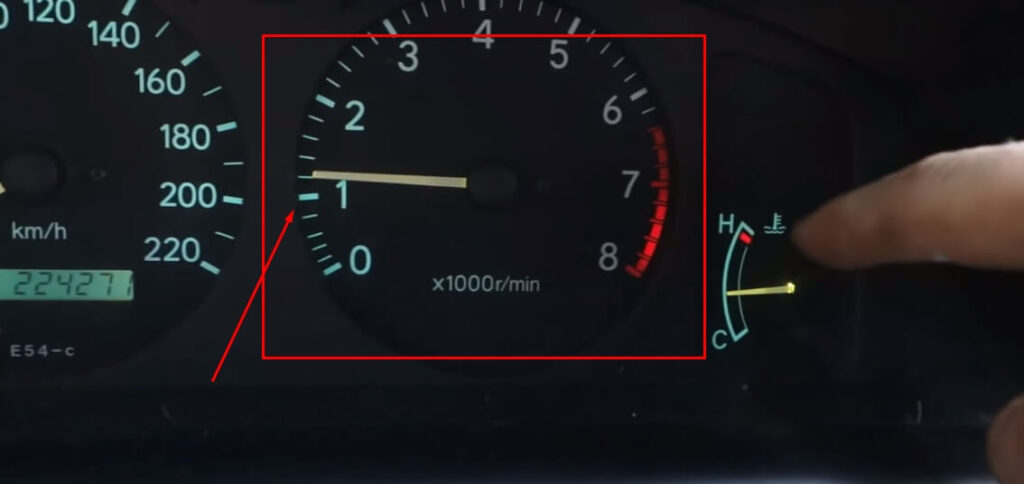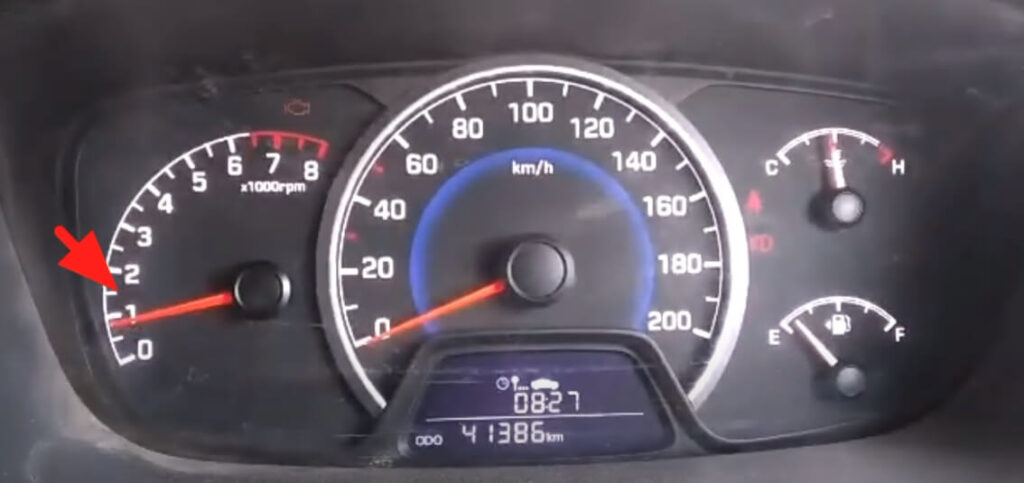Your RPM might fluctuate while parked due to various reasons. One possible explanation could be the idle control system adjusting to maintain engine stability. Factors like temperature, engine wear, or electrical issues may influence these fluctuations.
Additionally, irregularities in the fuel delivery system or a malfunctioning sensor could contribute to variations in RPM.

Why does my car rpm go up and down when in park?
One possibility is an issue with the idle air control valve, which regulates the amount of air entering the engine at idle. Another factor could be a malfunctioning throttle position sensor, impacting the engine’s ability to maintain a steady RPM.
Additionally, vacuum leaks, faulty spark plugs, or a dirty fuel injector might contribute to these fluctuations.
Regular maintenance and thorough diagnostics can help identify and address the specific issue affecting your vehicle’s RPM stability.
What does it mean when the rpm goes up and down?
When the RPM (revolutions per minute) of an engine goes up and down, it signifies a potential issue with the engine’s performance or the vehicle’s drivetrain.
Several factors could contribute to this fluctuation. One possible cause is a problem with the idle control valve or throttle body, which are responsible for maintaining the engine’s idle speed. If either of these components malfunctions, the RPM may vary inconsistently.
Another potential reason is the presence of vacuum leaks, where unintended air enters the engine, disrupting the air-fuel mixture and causing RPM fluctuations.
Fuel system problems, such as a clogged fuel filter or a faulty fuel pump, can also disrupt fuel delivery, resulting in inconsistent engine performance.
Issues with the ignition system, such as faulty spark plugs or ignition coils, can cause misfires, leading to RPM fluctuations.
Additionally, malfunctioning sensors or problems with the engine control unit (ECU) can disrupt engine performance and result in RPM fluctuations. In vehicles with automatic transmissions, RPM variations could be a sign of transmission problems, such as slipping gears or a failing torque converter.

What causes rpm to fluctuate while idling?
RPM fluctuations during idle can stem from various factors. Common causes include issues with the idle air control valve, vacuum leaks, malfunctioning sensors like the mass airflow sensor or oxygen sensor, and even problems with the fuel system such as a clogged fuel injector.
Mechanical problems in the engine, such as worn-out spark plugs or a dirty air filter, can also contribute to idle RPM fluctuations. It’s essential to conduct a thorough inspection and diagnostic tests to pinpoint the specific issue causing the variation in RPM.
Symptoms Of Rpm Fluctuation
Some of the symptoms that may indicate rpm fluctuations are:
- Vibrations: If the car shakes or vibrates while idling, it may mean that the rpm is fluctuating. This could happen due to various reasons, such as engine misfires, problems with the fuel system, worn-out spark plugs, or damaged engine mounts.
- Rough running: If the engine is not running smoothly, it can signal that the rpm is fluctuating. A rough idle can happen due to issues with the ignition system, vacuum leaks, dirty fuel injectors, or a clogged air filter.
- Stalling: If the vehicle stalls while idling, it may mean that the rpm is fluctuating significantly. This could happen due to various reasons, such as low fuel pressure, a weak battery, a damaged alternator, or a malfunctioning egr valve.
- Increased fuel consumption: If the car is consuming more fuel than usual and the rpm is fluctuating, it’s a sign of an underlying issue. A malfunctioning oxygen sensor, dirty fuel injectors, or a clogged air filter are some reasons for this symptom.
- Check engine light: Lastly, if the check engine light is on, it may signify that the rpm is fluctuating. The reasons could be many, such as issues with the fuel system, exhaust system, or the engine’s electronic control module (ECM).
By paying attention to these symptoms, you can identify if the rpm is fluctuating while parked and take corrective measures. It’s always best to consult a professional mechanic to diagnose and fix the underlying issue to keep your car running smoothly.
Car rpm fluctuates while idle
Car RPM fluctuations during idle can be attributed to various factors. Common causes include issues with the idle air control valve, vacuum leaks, or a malfunctioning throttle body. Dirty or clogged components within the fuel system, such as the fuel injectors or air filter, can also lead to irregular idle RPM.
Another possibility is a malfunction in the engine’s sensors, particularly those responsible for monitoring the air-fuel mixture or engine temperature. Ignition system problems, like faulty spark plugs or a malfunctioning ignition coil, may contribute to unstable idle RPM as well.
How To Fix Rpm Fluctuation?
RPM, short for revolutions per minute, gives a clear indication of how hard your engine is working. An engine with fluctuating RPM can exhibit performance issues, affecting the vehicle’s overall drivability. Imagine driving smoothly down the road when suddenly your car’s RPM starts to bounce up and down; this is not just an inconvenience but could signal potential problems under the hood.
To fix RPM fluctuation, first, check for any vacuum leaks and clean or replace the idle air control valve. Assessing the throttle position sensor and fuel pressure can also help rectify the issue.

Potential Risks Of Ignoring Rpm Fluctuations
| Risks | Consequences |
|---|---|
| Engine wear: | Shortens engine lifespan. |
| Unsafe driving conditions: | Increases the chance of on-road failures. |
| Costly repairs: | Leads to more significant, expensive fixes over time. |
| Pollution increase: | Contributes to environmental harm due to inefficiencies. |
Ignoring RPM fluctuations can lead to serious vehicle and financial repercussions.
Check engine light on rpm going up and down
Fluctuating RPM and a check engine light could be caused by various factors, such as a malfunctioning sensor, fuel system problems, or issues with the ignition system.
Why is my rpm at 1 when parked?
Your car’s RPM might be at 1 when parked due to various reasons. It could be a normal idle state, or there might be issues with the idle control system, such as a malfunctioning idle air control valve or a vacuum leak. Other factors, like a faulty sensor or a problem with the fuel system, could also contribute to this.
Why Does My Rpm Fluctuate While Parked?
Your rpm may go up and down while parked due to several reasons, such as a dirty air filter, a malfunctioning idle air control valve, or a clogged fuel filter.

Is It Safe To Drive With The Fluctuating Rpms?
If your rpm is fluctuating due to a minor issue, it may be safe to drive. However, if the rpm is fluctuating due to a significant issue, it can lead to further damage and put you in danger on the road.
How Can I Fix My Fluctuating Rpms?
Your rpms may be fixed by cleaning or replacing the dirty air filter, fixing a faulty idle air control valve, or changing a clogged fuel filter. It is best to have a professional diagnose and fix the issue to ensure proper safety.
Can A Low Battery Cause The Fluctuation Of Rpm?
Yes, a low battery may cause your rpm to fluctuate due to the alternator struggling to keep the electrical system running. Make sure to have your battery checked if you suspect this problem.
How Does A Dirty Air Filter Cause Rpm Fluctuation?
A dirty air filter restricts air flow to your car’s engine which affects the air/fuel mixture. When the engine cannot breathe properly, your rpm may fluctuate, and your car may stall or have trouble starting.
Conclusion
After assessing all the possible reasons why your rpm goes up and down while parked, it is evident that there are various potential causes. Some may be the result of a simple fix, while others may need the attention of a mechanic to prevent further damage.
A regular checkup of your engine and transmission is key to identifying problems early. This will save time, money, and prevent a potential safety hazard. It’s important to pay attention to any signs your vehicle is giving you, so you can act quickly and have the issue resolved before it worsens.
Whether it’s a vacuum leak, an electrical issue, or a faulty sensor, it’s crucial to take action immediately to ensure that your car is running smoothly. By following the above tips and consulting a professional mechanic, you can effectively diagnose the root cause and find the best solution for your fluctuating rpm while parked.
